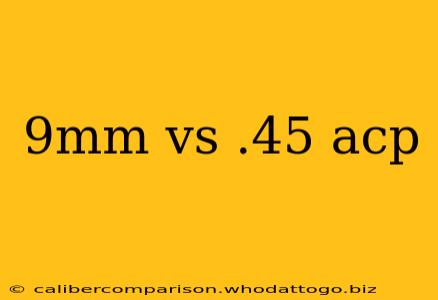Choosing between a 9mm and a .45 ACP is a classic debate among firearm enthusiasts. Both calibers have a rich history and dedicated followings, but which one reigns supreme? The answer, as with most things, depends on your priorities and intended use. This in-depth comparison will explore the key differences to help you make an informed decision.
Ballistics: A Tale of Two Bullets
The fundamental difference lies in their ballistics. The 9mm Parabellum (9x19mm) is a smaller, faster round, while the .45 ACP (11.43x23mm) is larger and slower. This difference impacts several key aspects:
Velocity and Energy:
-
9mm: Generally boasts higher muzzle velocity, leading to flatter trajectories at longer ranges. This translates to better accuracy at distance for many shooters. The higher velocity also often leads to greater penetration in certain materials.
-
.45 ACP: Offers significantly more stopping power due to its larger mass and diameter. The lower velocity results in a more pronounced bullet drop at longer ranges, demanding more precise aiming.
Stopping Power:
This is a hotly debated topic. While the .45 ACP's larger diameter and heavier bullet generally deliver more energy on impact, stopping power is a complex issue influenced by shot placement, bullet design, and the target's physiology. The 9mm, with advancements in bullet technology (like jacketed hollow points), has significantly narrowed the gap in recent years.
Recoil:
-
9mm: Typically exhibits less recoil, making it easier to control, especially for novice shooters. This allows for faster follow-up shots and improved accuracy in rapid-fire situations.
-
.45 ACP: Packs a noticeable kick, which can be challenging for smaller or less experienced shooters. This can impact accuracy and speed of follow-up shots.
Capacity and Concealability:
Magazine capacity significantly impacts the practical application of each caliber.
-
9mm: Higher magazine capacities are common in 9mm handguns, offering more rounds per magazine. This is advantageous in self-defense situations. The slimmer profile of 9mm pistols also often contributes to better concealability.
-
.45 ACP: Typically features lower magazine capacities, meaning fewer rounds available before reloading. While .45 ACP pistols are available in various sizes, they tend to be bulkier than their 9mm counterparts, making them less ideal for concealed carry in some cases.
Cost and Availability:
Both calibers are widely available, but there are some differences in cost:
-
9mm: Generally less expensive to purchase ammunition for, making it a more budget-friendly option for frequent practice.
-
.45 ACP: Ammunition is typically more costly, potentially impacting the overall cost of ownership for shooters who practice regularly.
Conclusion: The Best Choice Depends on You
There's no single "winner" in the 9mm vs. .45 ACP debate. The ideal choice depends heavily on individual needs and preferences. Consider the following factors:
-
Intended Use: Self-defense, target shooting, competition, or hunting will all influence your choice.
-
Shooting Experience: Beginners might find the 9mm's lighter recoil easier to manage.
-
Physical Attributes: Smaller shooters might prefer the lighter weight and less recoil of the 9mm.
-
Budget: Ammunition costs should be a factor in your decision.
Ultimately, the best way to determine which caliber is right for you is to rent or borrow firearms in both calibers and test them at a range. This hands-on experience will provide invaluable insight into which feels better and performs more effectively for your specific needs.

